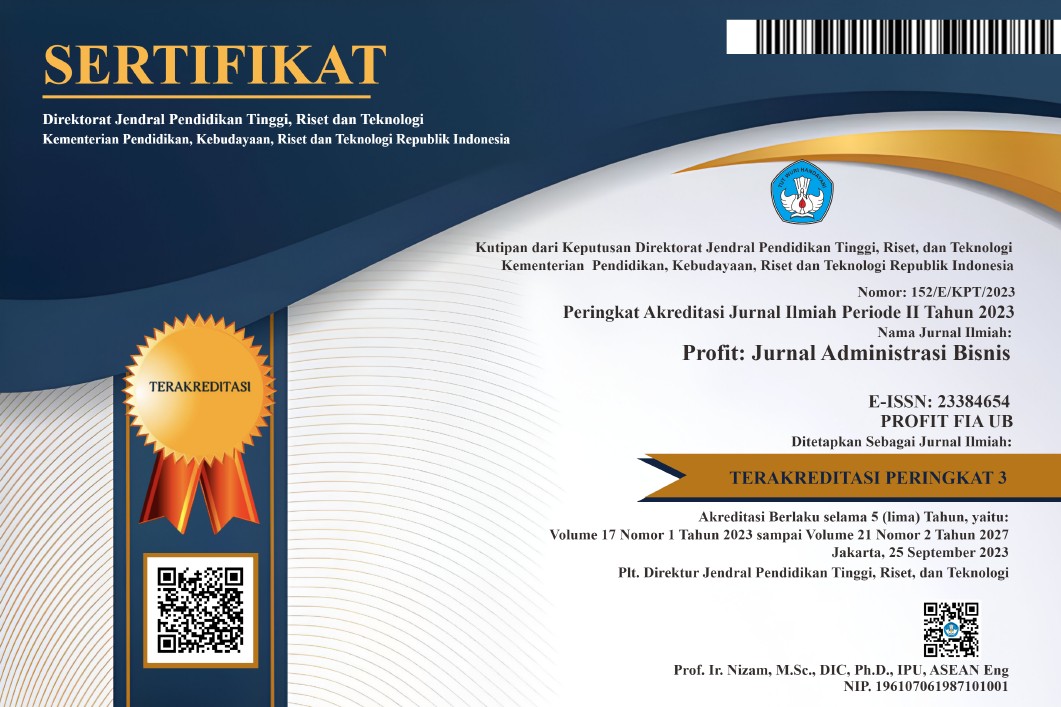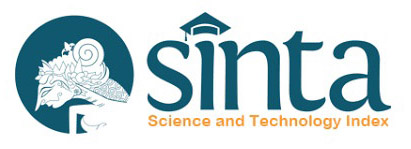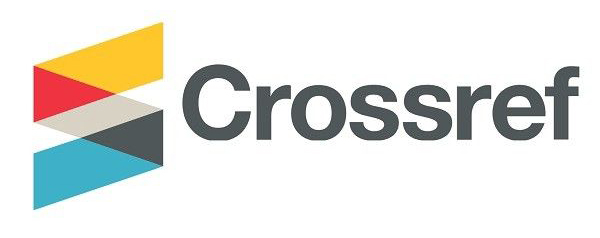POLA PRINSIP KEMITRAAN DALAM PENGEMBANGAN PARIWISATA DI KABUPATEN PURBALINGGA PROVINSI JAWA TENGAH
DOI:
https://doi.org/10.21776/ub.profit.2020.014.02.7Keywords:
Partnership Pattern, Tourism, Regional TourismAbstract
In the development of tourism in the region requires planning, strategy and innovation where managers and governments must seriously develop their regional tourism sector to improve the regional economy and society is descriptive qualitative with an inductive approach. Sources of data obtained from primary and secondary data. Data collection is done by observation, interviews, and documentation. Data analysis techniques through data reduction, data presentation, and drawing conclusions. The results showed that the partnership pattern in the development of tourism in Purbalingga District had gone quite well but not yet at maximum. This is stated by fulfilling the 3 principles of partnership namely mutual respect, respect and trust. To realize partnerships in tourism it is necessary to agree on the perception of partnerships between the private sector, the government and the community
References
Andrades, L., & Dimanche, F. (2017). Destination competitiveness and tourism development in Russia: Issues and challenges. Tourism Management, 62, 360–376. https://doi.org/https://doi.org/10.1016/j.tourman.2017.05.008
Chookaew, S., Chanin, O., Charatarawat, J., Sriprasert, P., & Nimpaya, S. (2015). Increasing halal tourism potential at Andaman Gulf in Thailand for Muslim country. Journal of Economics, Business and Management, 3(7), 739–741.
Creswell, J. W., & Creswell, J. D. (2018). Research and Design Qualitative, Quantitative and Mixed Methods Approaches. In Thousand Oaks California.
Deng, T., Hu, Y., & Ma, M. (2019). Regional policy and tourism: A quasi-natural experiment. Annals of Tourism Research, 74, 1–16. https://doi.org/https://doi.org/10.1016/j.annals.2018.10.001
Graci, S. (2013). Collaboration and partnership development for sustainable tourism. Tourism Geographies, 15(1), 25–42.
Hakim, A. R., Zaenuri, M., & Fridayani, H. D. (2019). Collaborative Governance In Managing Educative Tourism Of Jogja Exotarium In Sleman Regency 2019. Journal of Governance and Public Policy, 6(2), 195–215.
Harnida, H., & Tahir, M. (2012). Peran Pemerintah Daerah Dalam Pengembangan Obyek Wisata Hutan Batu Rammang–Rammang di Kabupaten Maros. Otoritas: Jurnal Ilmu Pemerintahan, 2(2).
Jafari, J., & Scott, N. (2014). Muslim world and its tourisms. Annals of Tourism Research, 44, 1–19. https://doi.org/https://doi.org/10.1016/j.annals.2013.08.011
Jonsa, A., & Salwan, Y. (2018). Kinerja Kantor Pelayanan Pajak Pratama (KPPP) Meulaboh dalam Meningkatkan Pelayanan Minat Wajib Pajak. Jurnal Public Policy, 3(2).
Kapera, I. (2018). Sustainable tourism development efforts by local governments in Poland. Sustainable Cities and Society, 40, 581–588. https://doi.org/https://doi.org/10.1016/j.scs.2018.05.001
Li, J., Xu, L., Tang, L., Wang, S., & Li, L. (2018). Big data in tourism research: A literature review. Tourism Management, 68, 301–323. https://doi.org/https://doi.org/10.1016/j.tourman.2018.03.009
Miles, M. B., Huberman, A. M., & Saldana, J. (2014). Qualitative Data Analysis: A Methods Sourcebook (3 ed.). United States of America: Sage Publications.
Mtapuri, O., & Giampiccoli, A. (2016). Towards a comprehensive model of community-based tourism development. South African Geographical Journal, 98(1), 154–168.
Park, J. H., Lee, C., Yoo, C., & Nam, Y. (2016). An analysis of the utilization of Facebook by local Korean governments for tourism development and the network of smart tourism ecosystem. International Journal of Information Management, 36(6, Part B), 1320–1327. https://doi.org/https://doi.org/10.1016/j.ijinfomgt.2016.05.027
Pike, S., & Ives, C. (2018). The restructuring of New Zealand’s Regional Tourism Organisations. Journal of Destination Marketing & Management, 9, 371–373. https://doi.org/https://doi.org/10.1016/j.jdmm.2017.11.005
Pudianti, A. (2012). Perpaduan Budaya Lokal dan Potensi Fisik sebagai Daya Tarik Wisata Pedesaan di Sleman, Daerah Istimewa Yogyakarta.
Republik Indonesia. Undang-Undang Republik Indonesia No. 10 Tahun 2009 Tentang Kepariwisataan.
Richards, G. (2018). Cultural tourism: A review of recent research and trends. Journal of Hospitality and Tourism Management, 36, 12–21. https://doi.org/https://doi.org/10.1016/j.jhtm.2018.03.005
Saarinen, J., Rogerson, C. M., & Manwa, H. (2013). Tourism and the millennium development goals: Tourism, local communities and development. Routledge.
Said, F., Salam, R., Akib, H., & Baharuddin, A. (2017). An Analysis of Tourism Visit Trend. 149(Icest), 34–36.
Said, F., Wahidiyat, A., Andayani, D. D., Harifuddin, H., & Salam, R. (2017). Development of Travel Attractions Through the Design of Google SketchUp Based Coastal Tourist Map (Pengembangan Daya Tarik Wisata Melalui Perancangan Peta Wisata Pantai Berbasis Google SketchUp). Pekommas, 2(2).
Situmorang, R., Trilaksono, T., & Japutra, A. (2019). Friend or Foe? The complex relationship between indigenous people and policymakers regarding rural tourism in Indonesia. Journal of Hospitality and Tourism Management, 39, 20–29. https://doi.org/https://doi.org/10.1016/j.jhtm.2019.02.001
Susilo, Y. S., & Soeroso, A. (2014). Strategi pelestarian kebudayaan lokal dalam menghadapi globalisasi pariwisata: Kasus Kota Yogyakarta. Jurnal Penelitian BAPPEDA Kota Yogyakarta, 4, 3–11.
Tomaselli, K. G. (2012). Cultural tourism and identity: Rethinking indigeneity. Martinus Nijhoff Publishers.
Zach, F. J., & Hill, T. L. (2017). Network, knowledge and relationship impacts on innovation in tourism destinations. Tourism Management, 62, 196–207.
Downloads
Published
Issue
Section
License
The copyright of the received article shall be assigned to the journal as the publisher of the journal. The intended copyright includes the right to publish the article in various forms (including reprints). The journal maintains the publishing rights to the published articles.

This work is licensed under a
Creative Commons Attribution-NonCommercial 4.0 International License

















